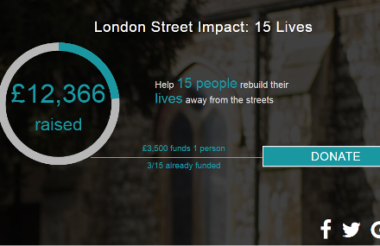Homelessness charity St Mungo’s has become the first charity to use a platform with blockchain technology to fundraise transparently.
It is using Alice, a donation transparency tool, to raise money for a project helping vulnerable people in London.
When people give, the charity only receives their donation if and when it achieves specific goals. These are listed on the appeal page and donors are kept informed of the progress the charity is making.
Rebecca Sycamore, executive director of fundraising at St Mungo’s, said: “People who have been sleeping rough for a long time often have complicated histories and issues they need help to tackle.
“This pilot gives us more flexibility than usual commissioned services do. It allows us to give these people the personalised support that we know will help them rebuild their lives away from the streets.”
St Mungo’s is aiming to raise £35,000 through Alice to help 15 people sleeping rough in London. So far it has raised £12,000.
St Mungo’s lists a number of goals it needs to achieve in order to receive donations, such as helping individuals find and then stay in a new home. One-to-one support is provided for up to six months after individuals move in, in order to help them adapt.
Alice takes 3 per cent of donations to cover running costs, and a further 1.6 per cent of donations made by card go towards debit/credit card fees. St Mungo’s receives the full amount of Gift Aid. So in total, a £10 donation with Gift Aid results in St Mungo’s receiving £12.04.
Smart contracts
The platform works by creating smart contracts between donors and the charity. Alice is built on a public blockchain called Ethereum, and has been supported by the Financial Conduct Authority.
Alice has also worked with Tramonex Labs, a fintech startup that issues e-money on the blockchain.
‘Potential to rebuild public trust’
The pilot is being delivered using grant funding from Nominet Trust’s Social Tech Seed programme.
Vicki Hearn, director of Nominet Trust, said: “Alice has real potential to rebuild public trust in charities thanks to its innovative use of blockchain technology. Nominet Trust is proud to support Alice in piloting this platform, helping to lift people out of homelessness, and raising the bar for the transparency, accountability and security of charitable giving.”
Alice hopes that if the pilot is successful it will be able to scale up.
Raphaël Mazet, chief executive of Alice, said: “The charity sector is currently going through a crisis of public trust. We want to address that by helping trailblazing organisations like St Mungo’s, who are committed to transparency, to raise more funds for the amazing work they do.
“We’re excited to be launching this first pilot with an appeal that will make a really positive difference to the lives of 15 people. We hope to scale the project to help many more people if it’s successful.”
Report: Losing the Middle but Keeping the Heart: Blockchain, DAOs and the future decentralisation of charity
Elsewhere, the Charities Aid Foundation has published its fourth report on blockchain technology and charities, entitled Losing the Middle but Keeping the Heart: Blockchain, DAOs and the future decentralisation of charity.
The latest paper explores how charities could take advantage of technology that reduces the number of intermediaries when transferring money overseas.
It also looks at how the governance of civil society organisations could be disrupted by using blockchain technology and the impact that the convergence of artificial intelligence technology and blockchain technology could have.
|
Related articles












